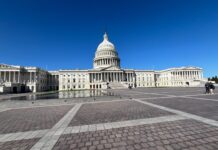
(GA Recorder) — Health care advocates cheered a U.S. Supreme Court decision Thursday rejecting a challenge of the Affordable Care Act pushed by Texas and more than a dozen other GOP-led states, including Georgia.
The justices ruled with a 7-to-2 majority that the states lacked standing to challenge the constitutionality of former President Barack Obama’s health care law. The states had argued they were harmed by the law because it led to increased costs, including to their state-run Medicaid programs.
Thursday’s ruling, which was backed by two of former President Donald Trump’s nominees to the bench, marked the third major legal challenge of the 2010 law to fail at the nation’s highest court.
At stake was the health care coverage of more than 21 million people nationally who have gained insurance through the marketplace.
In Georgia, more than a half-million people enrolled in health plans this year, with 88% of them receiving assistance to lower monthly premiums or other out-of-pocket costs, according to the patient advocacy group Georgians for a Healthy Future. Tens of thousands more have enrolled during an ongoing special enrollment period due to the pandemic that ends Aug. 15.
Georgia has one of the highest uninsured rates in the country, with about 13% of the state’s residents lacking coverage, according to the Kaiser Family Foundation.
“While we were disappointed to see such a frivolous lawsuit endure as long as it did, we are hopeful that this will be the last attempt to overturn the law that has provided quality, affordable coverage to hundreds of thousands of Georgians,” Whitney Griggs, health policy analyst with Georgians for a Healthy Future, said in a statement.
The case had centered on whether the entire law should be thrown out altogether after Congress moved in 2017 to zero out the financial penalty for most Americans who do not obtain health care coverage, a provision known as the individual mandate. The states filed their lawsuit in 2018.
“The state plaintiffs have failed to show that the challenged minimum essential coverage provision, without any prospect of penalty, will harm them by leading more individuals to enroll in these programs,” Justice Stephen G. Breyer, who was appointed by President Bill Clinton, wrote in the opinion.
Breyer questioned the influence of the provision without a penalty. “A penalty might have led some inertia-bound individuals to enroll. But without a penalty, what incentive could the provision provide?” he wrote.
Justices Samuel Alito and Neil Gorsuch dissented.
Georgia Attorney General Chris Carr, who is a Republican, said in a statement Thursday that the group of states “felt strongly that the ACA was unconstitutional.”
“While we are disappointed that the Court declined to weigh in on the merits of the case, we will respect the Court’s decision,” Carr said. “I stand by my pledge to ensure we have the world-class health care system that all Georgians and our nation truly deserve.”
Carr’s role in the high-profile challenge of the health care law will likely loom over his reelection bid next year.
“It’s past time for this Republican-led war against health care to end,” said Staci Fox, president and CEO of Planned Parenthood Southeast Advocates. “This is yet another reminder of why elections matter and why we must continue to push for health care champions who will advocate on behalf of people, not politics.”
At least two Democrats, state Sen. Jen Jordan and 2018 nominee Charlie Bailey have announced campaigns; both quickly criticized Carr’s involvement in the lawsuit after Thursday’s ruling.
And advocacy groups used Thursday’s ruling as an opportunity to renew their calls for state lawmakers to expand Medicaid under the Affordable Care Act. The state’s GOP leaders have long panned traditional Medicaid expansion as potentially too costly in the long run.
Georgia is one of about a dozen holdout states that have passed on expanding eligibility to low-income adults without children, even as Congress sweetened the financial incentives to do so in March.
“To further ensure Georgians can access care, state leaders should immediately capitalize on the increased federal support for Medicaid expansion and extend coverage to more than 500,000 people across our state as Congress looks to additional solutions like continuing the expansion of premium tax credits for health insurance that allow more Georgians to afford coverage,” Laura Harker, senior policy analyst with the Georgia Budget and Policy Institute, said in a statement.
Republican Gov. Brian Kemp is instead pressing forward with his proposal for a slight expansion of Medicaid after a federal agency flagged requirements that a person complete 80 hours of work or other activities to qualify.
Democratic U.S. Sen. Raphael Warnock said this week that he is continuing to work on legislation that would create a work-around for the state’s resistance to Medicaid expansion.
“We want to see legislation in the near future that will provide a way for the Georgia taxpayer to get access to their own money,” Warnock said in a virtual press conference Wednesday. “Georgia taxpayers don’t get a refund because Georgia politicians refuse to expand Medicaid … Meanwhile, we’re subsidizing health care in other states.”







